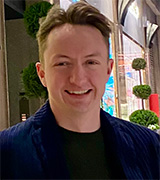Building the Bridge
My Journey from NIH Postbaccalaureate Fellowship to Medical School
BY STEPHEN ANDREWS, NCI

CREDIT: STEPHEN ANDREWS
Pictured are several members of Sadowski’s research team (from left to right) Steven Forsythe, James Madigan, Srujana Yellapragada, Stephen Andrews, and Samira Sadowski.
Working full time in a lab each week while living on my own in a new city was a stark shift from the college-town environment with a comfortable routine of classes and social events that previously filled my days. I felt lost on the very first day of my NIH postbaccalaureate fellowship as I roamed Building 10 searching for the Clinical Center. Fortunately, I was met with plentiful friendly faces who helped me find my way.
The first stages of my research fellowship consisted of many repeated, and sometimes failed, experiments. I initially did not experience much of the “discovery” I was hoping for, and I felt somewhat disconnected from the scientific process, which was disheartening. We quickly learn that research entails troubleshooting and negative data, in addition to discovery. I had to learn how to pivot and treat every set of data as a piece of the larger puzzle. Now, I liken this stage of my scientific training to training wheels on a bike. Slowly, after mistakes that cause you to fall, you eventually learn to balance on your own.
Mentorship and support were vital for me at this stage. I felt supported by colleagues in the lab, by other postbacs who became my friends, and by informal mentors both within and beyond the walls of the NIH. I learned to ask questions, get curious, and advocate for myself. Many of the techniques that we learn in science require specific skills that we must develop over time. Lucky for me, both the staff scientist and postdoc in my lab had many tips for success, including how best to run a sodium dodecyl-sulfate polyacrylamide gel electrophoresis and transfect fragile cancer cells. I learned that making a mistake or ending up with negative results does not define me as a scientist, and that sometimes negative results or an unsupported hypothesis are just as important in science as other outcomes. This mindset is how I started building resilience.
Once I found my balance in the lab, I was ready to take on an independent project. This came with its own challenges, of course, as I established my research question and hypothesis, which included reading a lot of literature and engaging in many constructive discussions with my aforementioned staff scientist, James Madigan, and principal investigator, Samira Sadowski, who is a physician-scientist in the surgical oncology program and head of the Neuro-Endocrine Cancer Therapy Section at NCI. I attended research talks and shadowed physicians, which was particularly helpful as I was intrigued by the transcriptomic and epigenetic mechanisms associated with cancer metastasis. I eventually figured out that single-cell sequencing technology would be the best-suited method to answer my research question.
I worked hard to establish trust with my PI to embark on a project that required funding and time. We have the privilege here at NCI, and the NIH more broadly, to think outside the box, to explore new ideas with new technology, and I believe I would not have had the opportunity to do what I do at my training level anyplace else. Getting that first impactful, positive result from your own research is exciting and fulfilling. I am most proud that I was able to use an innovative method to start blazing a path toward improved therapies for patients with a neuroendocrine tumor with liver metastasis.
Another key aspect of my postbac fellowship, what I call my bridge-building years, is how much it improved my candidacy for the next step in my career. The beauty of these bridge-building years was the time it allowed me to explore and reflect on my personal mission within science and medicine. I was able to walk from my desk to an operating room observation to watch my mentor resect a rare tumor from a patient. Then, I witnessed the data that sprang from our organoid modeling of that same tumor in the following months. I was amazed to see the seamless blend of science and medicine. So, I chose to focus on this in my medical school applications and my personal statement. I addressed my research experiences in every medical school interview I sat through, and I was able to give each interviewer a glimpse into some of our intriguing findings. I believe that my experience at the NIH contributed significantly to my medical school acceptance.
I want to emphasize that none of us are alone on this journey. As we bridge from undergraduate studies to the next stage of our professional careers, it is important we take some time to learn from and grow alongside those around us. Like a bridge, we need a solid foundation, strong support, and a bit of flexibility to succeed. Know that the time you spend at NIH will help get you from where you are now to where you want to be.

Stephen Andrews, a regular contributor to the NIH Catalyst, recently concluded his postbaccalaureate fellowship at the NCI, studying endocrine cancer metastasis. In August, he will begin pursuing his MD-PhD at the Ohio State University College of Medicine in Columbus, Ohio.
This page was last updated on Tuesday, December 3, 2024
